War Requiem
Introduction
It's less than a week ago that those who cared enough stood for two minutes in silence at 1100hrs on 11 November to remember those who had fallen in conflicts far and wide. Despite initially being a rather British commemoration of those who fell in the Great War (the War to end all wars…), for some this is a time to reflect on all those who fell whilst serving their country in all the wars and battles that our armed forces have been involved with during the period since 11/11/1918.
Amongst the most celebrated of the war poets of the First World War was Wilfred Owen, a Second Lieutenant with The Manchester Regiment. Owen's outlook on life changed dramatically due to the trauma he suffered during his short military life and was reflected in his poetry. Owen was tragically killed on November 4th, just one week before the Armistice.
The War Requiem piece was written by Benjamin Britten after he was commissioned in 1962 to produce a piece for the reconsecration of Coventry Cathedral, the original structure destroyed during a German bombing raid in May 1940. This bombing has since become controversial in that it is believed that Winston Churchill knew of the plan to bomb Coventry due to the work of Bletchley Park in deciphering the Enigma Code but knew that if he took action that the Germans would realise this - however, I digress. Britten was a pacifist and conceived of a piece that interwove the Latin Mass for the Dead with poems by Wilfred Owen, alongside full orchestration.
In the late 80's director Derek Jarman and producer Don Boyd conceived of an idea to make a film of War Requiem, Jarman being a big fan of both Wilfred Owen and Benjamin Britten. Decca Records, who owned the rights to the recording, insisted that the 1963 recording of War Requiem was heard in its entirety and was not interrupted by any dialogue or sound effects. And so Jarman created a series of set pieces to compliment the score and tell the story of an WW1 English Officer based on Owen with a montage of images of both period and modern warfare.
This edition of the film, the 20th Anniversary Edition, is released with a new high definition transfer and a remastered soundtrack.
Audio/Visual
LPCM Stereo soundtrack, which I was initially disappointed about as surely something like this is best heard in 5.1 Surround; however, my disappointment was quelled was I heard Britten's music in full flow. It sounds glorious. I'm not a fan of classical music per se, but this music is stunning.
The picture has been remastered and looks fantastic, even for a print that's 'only' twenty years old. It's certainly the high definition transfer that is promised on the tin and looks as if it was filmed only last week. Absolutely brilliant.
Extras
Requiem For Jarman - 36 minute featurette that mainly features interviews from both Don Boyd and Tilda Swinton but also contains contributions from Nathaniel Parker.
Commentary from Don Boyd - I have to admit that I didn't really listen to a lot of this bar the last five minutes or so (I wanted to hear his thoughts on Sean Bean carrying the wreath), but it is a detailed, if somewhat dry, commentary that is certainly very informative for those (like me) not too interested in art.
War Requiem Live In Liverpool - featurette on the collaboration between the Royal Liverpool Philharmonic and German Choirs to perform War Requiem in Liverpool Cathedral as part of Liverpool's European Culture Capital celebrations earlier this year.
Overall
What passing-bells for these who die as cattle?
Only the monstrous anger of the guns.
Only the stuttering rifles' rapid rattle
Can patter out their hasty orisons.
No mockeries now for them; no prayers nor bells,
Nor any voice of mourning save the choirs,
The shrill, demented choirs of wailing shells;
And bugles calling for them from sad shires.
What candles may be held to speed them all?
Not in the hands of boys, but in their eyes
Shall shine the holy glimmers of goodbyes.
The pallor of girls' brows shall be their pall;
Their flowers the tenderness of patient minds,
And each slow dusk a drawing-down of blinds.
So begins War Requiem, Sir Laurence Olivier in his last ever role as the Old Soldier reading probably Wilfred Owen's most famous poem: Anthem For Doomed Youth. The juxtaposition of the poetry with the close up of Olivier is a powerful one, you can almost sense that the most celebrated British actor, who was incredibly ill at the time, mustered all his acting skills to bid a final farewell to his audience.
It's an impressive start and whilst it doesn't always hold together, it is still a very powerful piece on the futility and tragedy of war. This is essentially a silent film despite the actors speaking dialogue during segments that you can't hear, sometimes with Britten's music flowing over and around them, sometimes with the actors reacting to the music. What you get though is a superbly acted series of both set pieces and montages of related images (both period and modern) that together with the music and poetry tell a very real story of how war, whilst thought of in grand terms as nation on nation, is in reality the story of man inflicting death and suffering on fellow man, with families at home waiting in anguish for news and then suffering intolerable grief when they realise that their loved ones have fallen.
The core cast are superb. Tilda Swinton as the nurse and sister of Nathaniel Parker's officer and Owen Teale as the unknown soldier, but in reality is the friend who enlisted with Parker. All three shine in their respective roles and it was a joy to see Owen Teale as he is just one of those actors who is superb in just about everything he does but seems to be underrated. Sean Bean has a minor role as a German soldier, odd to see him play this after being used to him as archetypal rough and ready English officer Richard Sharpe, but his minor role is used to great effect when you see him carrying a wreath of poppies and laying it before the Unknown Soldier. It's a superb touch having a German soldier carry a very British symbol of war, or the remembrance of it, and show respect for the symbol of those who fell. It's a powerful reminder that in the grand scheme of things, we are all very much alike bar the language we speak and the uniform we wear.
Superb film and worth picking up even if you have an earlier edition, I can pretty much guarantee that this will look and sound better than you have seen before.
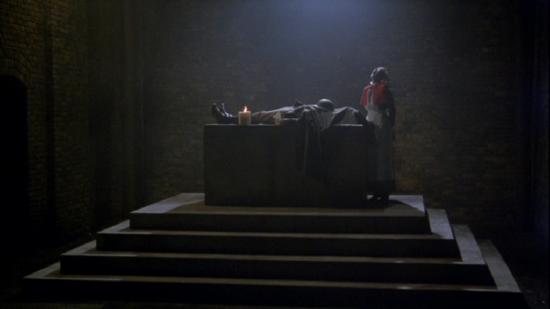
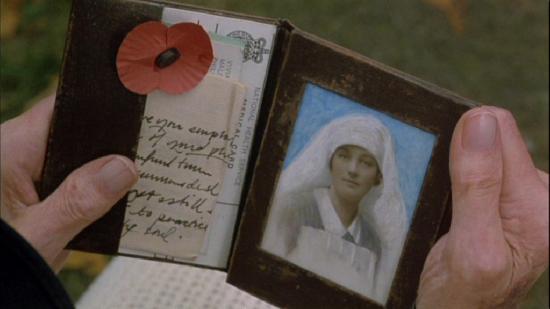
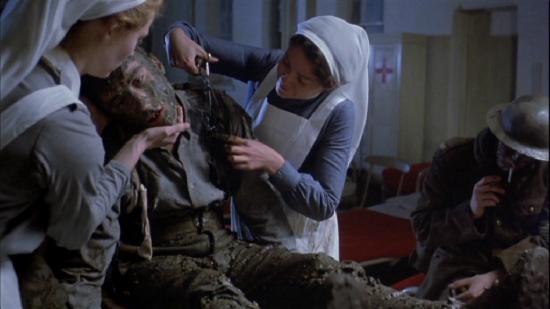
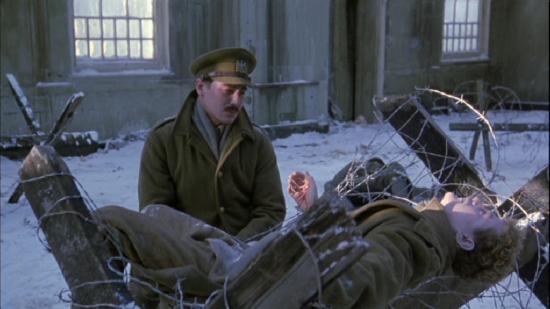
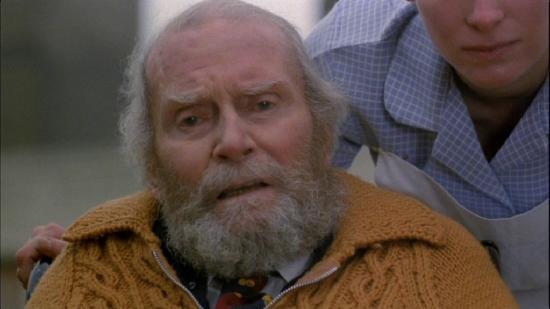
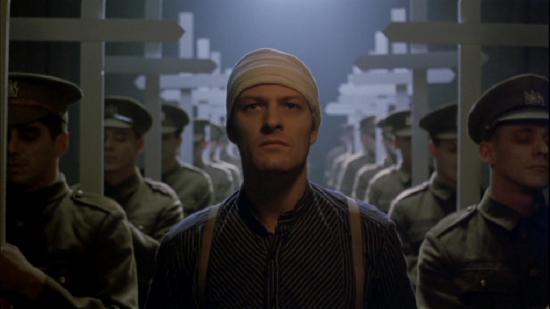
Your Opinions and Comments
Be the first to post a comment!